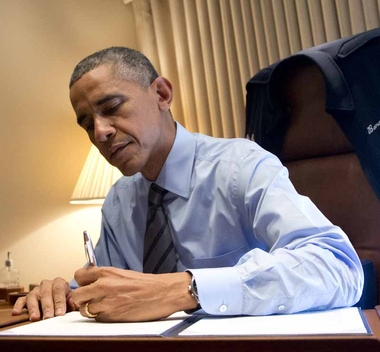Why it matters: Executive Authority

Washington (Ap) — The Issue: "Your Majesty" isn't in the American political lexicon. But when a president sets a major policy by edict, skirting Congress, it invariably sets off a debate that traces back to the time of kings and queens — and the Founding Fathers who rejected the authority of the crown.
Lawmakers cry foul when a president, especially of the other party, usurps their authority through executive action. Defenders say it can be the only way to get something done when those lawmakers tie everything up in knots.
President Barack Obama has used his executive authority expansively, most notably on the issue of immigration, on which he moved unilaterally to curb deportations for millions of immigrants in this country illegally. The Supreme Court deadlocked in June over the major portion of the immigration executive actions, effectively killing the plan for the rest of Obama's presidency. He's tested the limits of executive authority in other areas, too, as have presidents before him.
___
Where they stand
On immigration, Democrat Hillary Clinton has pledged that as president she would work to restore the Obama programs and go further. Republican Donald Trump said he would make sure Obama's "unconstitutional actions" never come back.
But Republicans including House Speaker Paul Ryan have been openly concerned about some of Trump's comments that suggest he, too, might pursue an "imperial presidency." He's supported reinstating waterboarding and other extreme forms of torture; has indicated he would revisit libel protections of journalists, notwithstanding the First Amendment; and has suggested the military would follow his orders even if illegal.
___
Why it matters
Obama claimed that congressional inaction gave him no choice but to act on his own on immigration. Indeed, as long as the House remains in GOP hands, action on a comprehensive immigration bill is unlikely, making presidential initiative a major arena of advancement on that issue.
However, the Constitution created a system of checks and balances meant to ensure that America could not be hijacked into becoming a monarchy like the one from which the nation had just freed itself. Republicans argue that under Obama, an undue amount of authority has accrued in the executive branch, and that to ensure the intended functioning of our democracy, that power must be checked. In this election season, a few lawmakers, including Republican Sen. Marco Rubio of Florida, have campaigned on promises to check executive power next year no matter who is in the White House.
Obama has also used his executive authority to change certain elements of his health care law, and has flexed his authority in other areas as well, like the environment. The White House even mulled closing the Guantanamo Bay prison via executive action, though the administration ultimately did not pursue that route.
In 2014 Obama famously promised to get around a balky, GOP-led Congress with the tools at his disposal, saying "I've got a pen, and I've got a phone" and pledging to use his pen to sign executive orders "that move the ball forward."
By Erica Werner, AP Congressional Correspondent. Copyright 2016 The Associated Press. All rights reserved. This material may not be published, broadcast, rewritten or redistributed.
The Gayly – September 22, 2016 @ 2 p.m.





